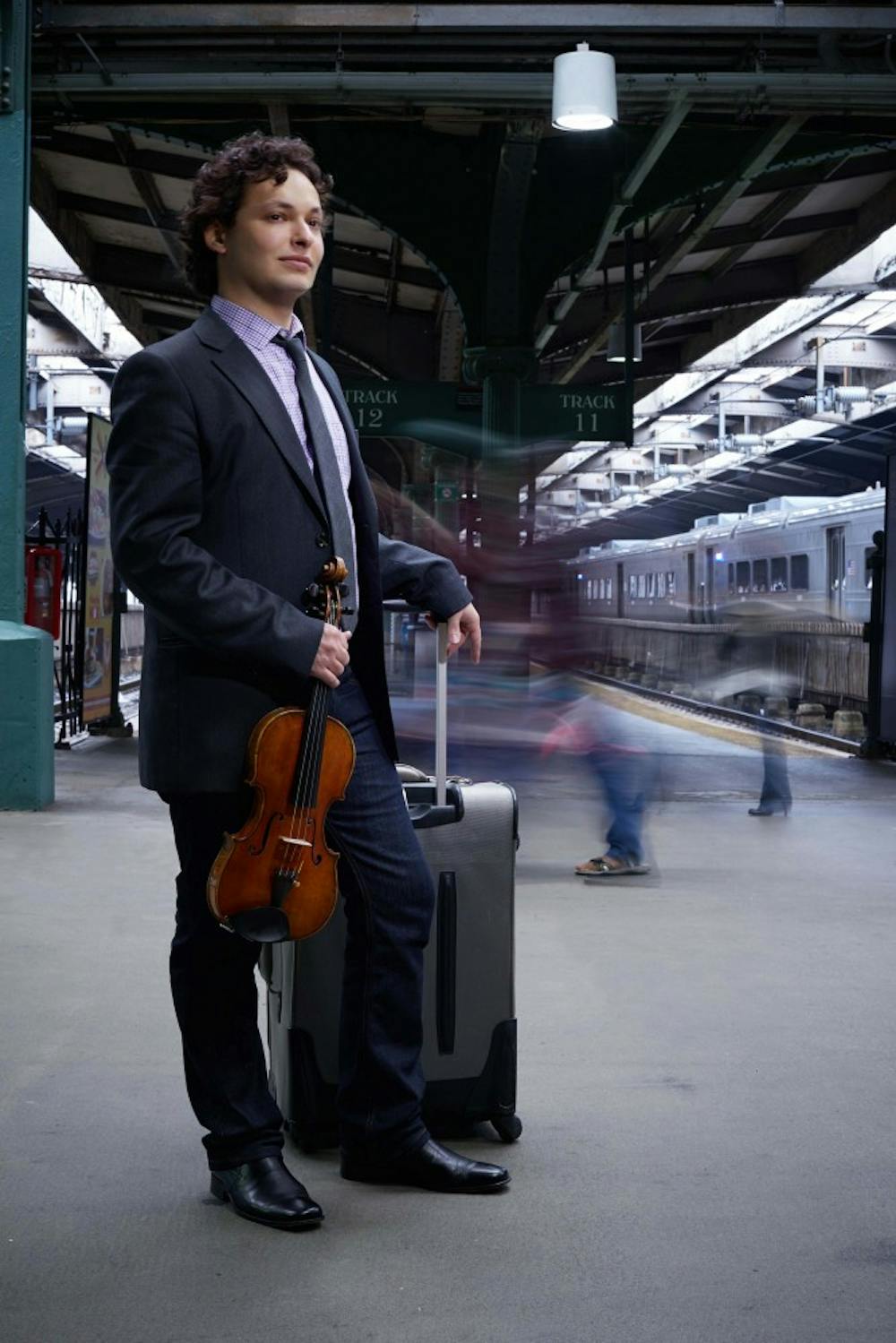The Tuesday Evening Concert Series continues to bring some of the finest classical chamber musicians to Charlottesville. This week, Russian-American violinist Yevgeny Kutik and American pianist Spencer Myer teamed up to deliver a series of duets for a strong audience in Old Cabell Hall with the Maurice Amado Foundation as Principal Underwriter.
The evening began with Felix Mendelssohn’s “Sonata in F Major.” The program makes particular note of this piece’s odd history, as it had been left unfinished by Mendelssohn in 1839, only to be revised by Yehudi Menuhin in the 1950s. The first movement of the piece was agile and graceful, weaving in and out of a heavily arpeggiated theme to show off the performers’ ranges. The second movement shifted gears completely, slowing down for an almost hauntingly pensive atmosphere, but the tempo went back up again for the third movement — not the elegant speed of the first, but rather a frenetic, desperate speed that mellowed for a few periods only to relentlessly hasten. As they finished, the performers seemed almost relieved to have made it through to the end of the piece.
Following that relatively simple but effective opener, the next piece was a more emotionally complex affair, “Baal Shem: 3 Pictures of Chassidic Life” by Ernest Bloch. Though the evening was not announced as having a particular theme, several of the songs performed either came from Jewish composers or carried Jewish themes, perhaps reflecting Yevgeny Kutik’s Jewish heritage. “Baal Shem” was written with very specific Biblical scenarios in mind, which shone through in the performances. The first movement, Vidui, carried notes of pride, horror and regret in the manner of a sinner repenting before God, while the second movement — Nigun — evoked ecstatic religious chanting. Finally, the song closed with an energetic and lively celebration of Moses handing down the torch to the children of Israel.
After a brief intermission, the evening continued with “Beau Soir” by Claude Debussy. Though originally written as an accompaniment to a poem, the instrumental transcription communicated the intended themes quite well. Myer’s earthy piano chords and Kutik’s long, drawn-out bow strokes combined to paint a picture of a sweet sunset tinged with melancholy. It was a good choice to ease the audience back in from the intermission with this briefer piece before diving into the longest performance of the night, “Sonata in A Major” by César Franck.
“Sonata in A Major” was arguably the most technically challenging piece of the night, opening with a wandering first movement of yearning before launching into a virtuosic second movement. This was the pianist’s time to shine, as Spencer Myer constructed what can only be described as a wall of sound, notes upon notes filling the air, continuously building on themselves only to turn away, never achieving a sense of completion and expanding upon a general sense of inquisitive questing. This was further explored in the third movement — a quiet, uncertain affair — before resolving in the fourth movement with a melodious canon. Though certainly impressive, this performance perhaps best demonstrated the one flaw of Myer and Kutik’s pairing. Though Myer was more than capable of supporting Kutik when called upon, there were times that it seemed that Kutik was overwhelming Myer’s sound when Myer should have had more prominence. Nevertheless, the sonata finished to rapturous applause, and the two moved on to the final performance scheduled for the evening, “Tzigane” by Maurice Ravel.
“Tzigane” was the most distinct piece of the night. Kutik opened the piece alone, at first understated but gradually building, surpassing normal bounds of complexity so that by the time Myer came in the sound had become warped and surreal. Though perhaps not technically the most difficult of the night, this performance, more so than the prior ones, truly demonstrated why these two artists are so respected in their fields. They tackled the song’s many bizarre diversions with such skill that it seemed hard to believe that only two musicians were present. Indeed, with the song’s dramatic conclusion the audience broke out into a standing ovation.
To thank the audience for their support, the two artists decided to close the night with an encore and performed Maurice Ravel’s “Kaddish.” “Kaddish,” adapted from a Hebrew prayer hymn of the same name, was rich and thankful in a way that seemed appropriate for the end of the concert. The night made for yet another wonderful entry in the Tuesday Evening Concert Series. Anyone with a passion for or interest in classical music should look forward to the next concert in the Series, an a capella performance by British vocal ensemble “The Tallis Scholars,” Nov. 28.







